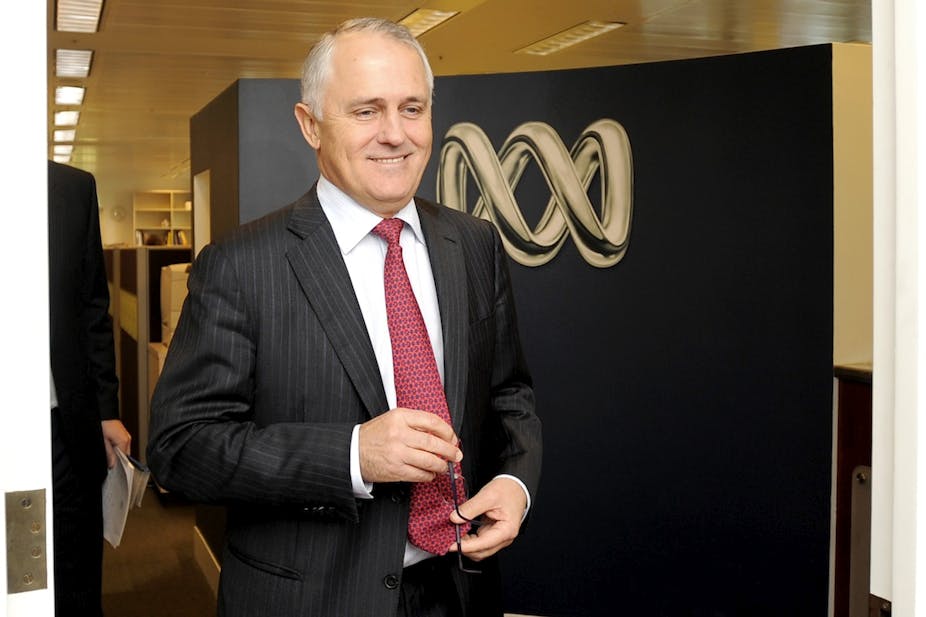Did SBS chief executive Michael Ebeid score a well-timed free kick or an own goal in his attack on the ABC this week?
The ABC recently secured the free-to-air television rights for the Asian Cup football tournament to be held in Australia early next year, together with tonight’s match between the Socceroos and Japan. A lower bid by SBS – still in some circles fondly known as the “Soccer Broadcasting Service” – was rejected, dealing a significant blow to the smaller public broadcaster.
The ABC was reportedly asked to make a bid by Football Federation Australia. The FFA presumably believes the ABC’s coverage will attract larger audiences to the game. This is despite SBS’s long-term success with the sport. It should not be forgotten, however, that while SBS has largely been defined by its long connection with the world game, ABC was the home of football from the late 1950s until the 1980s.
But the stoush is only partly about football. It was surely no coincidence that it comes on the eve of the government’s formal announcement of the size of the cuts to public broadcasting.
In The Australian newspaper earlier this week, Ebeid described the ABC’s bid as a “waste of $1.5 million”. SBS’s CEO was clearly seeking to contrast his organisation with its older, larger, and much better-funded sibling. As he told the annual Screen Producer’s conference this week, “[SBS’s] difference is our strength”.
Whereas the ABC is principally funded by direct government appropriation, SBS currently earns 30% of its revenue from advertising. SBS planned to cover the cost of its bid for the Asian Cup rights from advertising and sponsorship.
Whereas the ABC has vigorously and publicly fought the government’s demands for savings, SBS presents itself as a model of efficiency, diplomacy and fiscal responsibility. And whereas members of the ABC’s board and its managing director have publicly defended the institution on many occasions this year, their counterparts at SBS including newly installed Chairman Nihal Gupta have been notable by their silence. Until, that is, this week’s remarks by Michael Ebeid.
In contrast to the ABC’s warnings that jobs and programs will inevitably be cut, Ebeid this week expressed confidence SBS can “absorb most of the cuts without impacting on the services we provide”.
Unlike the very public discussion of which programs and services might be cut at the ABC, very little has been discussed about changes at SBS. The only SBS program that seems certain to be diminished is Dateline. This in part reflects a further difference between the two broadcasters: while ABC outsources a large amount of production, it still has significant internal capacity. SBS, on the other hand, outsources all program production except news and sport.
Quantifying the cuts
Last night on the ABC’s Q&A, Malcolm Turnbull indicated the ABC’s budget would be cut by an average of 5% over five years. This has been interpreted as translating to around A$50 million per year, although it’s possible savings could be weighted more heavily to later years. If SBS is treated similarly, it would need to find savings of between A$12 and A$13 million per year.
It is however by no means certain that the two organisations will be treated the same. There is a strong suggestion SBS will be allowed to screen more advertising, and therefore in theory earn more of its own revenue (currently around A$90 million per year) to offset some of the anticipated cuts to the government appropriation.
In contrasting the ABC’s “waste” with his own organisation’s efficiency in working with a shoestring budget, Ebeid gave a clear indication he believes the government will recognise the two broadcasters’ differences.
Ebeid told The Australian:
I’ve got to give (Communications Minister) Malcolm Turnbull credit because he’s spent a lot of time understanding the business and how we do stuff.
So he understands the economics of the place and the fact we’re already doing things more efficiently than probably any other broadcaster.
We just don’t have the money; we’ve never had the money, so we’ve had to do things creatively and innovatively, and that’s been well recognised and we’re happy with that.
In rekindling an old rivalry with the ABC, Ebeid may have made more difficult one of the recommendations of the Efficiency Review commissioned by Turnbull earlier this year. The review (which has still not been made public) is understood to have recommended that the two broadcasters share the same premises, with the vacated buildings sold off.
Former Prime Minister Malcolm Fraser, whose administration presided over the establishment of SBS, was an early and vigorous critic of this proposal. Fraser described cohabitation as “the first step towards the abolition of the SBS”.
The present government is no doubt well aware that the last time amalgamation of the two public service broadcasters was seriously proposed – by the Hawke Labor government in the mid-1980s – it was defeated in the Senate after fierce criticism from ethnic communities. Full-scale amalgamation seems highly unlikely now. And after Ebeid’s intervention even some lower level of integration will create internal difficulties for the two broadcasters as well as more public criticism for the government. We will know more by the end of this week.

